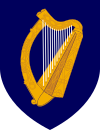
Back Визни режим Ирске Serbian İrlanda'nın vize politikası Turkish Chính sách thị thực của Ireland Vietnamese
 |
|---|

The visa policy of Ireland is set by the Government of Ireland and determines visa requirements for foreign citizens. If someone other than a European Union, European Economic Area, Common Travel Area or Swiss citizen seeks entry to Ireland, they must be a national of a visa-exempt country or have a valid Irish visa issued by one of the Irish diplomatic missions around the world.
Although Ireland is a member of the European Union, it is not part of the Schengen Area and therefore sets its own visa policy. Ireland also operates the Common Travel Area with the United Kingdom, the Channel Islands and the Isle of Man which specifies open borders between the countries and territories. Established in 1923, it permits British and Irish citizens freedom of movement around the Common Travel Area and to cross its borders with minimal or no identity documents.[1][2]
The visa policy of Ireland is similar to the visa policy of the Schengen Area. It grants visa-free entry to all Schengen Annex II nationalities, except for Albania, Bosnia and Herzegovina, Colombia, Dominica, Georgia, Honduras, Kosovo, Marshall Islands, Mauritius, Micronesia, Moldova, Montenegro, North Macedonia, Palau, Peru, Serbia, Timor-Leste, and Venezuela. Ireland also grants visa-free entry to several additional countries – Belize, Eswatini, Fiji, Guyana, Lesotho, Maldives, and Nauru.
- ^ "Common Travel Area between Ireland and the United Kingdom". Citizens Information Board. Retrieved 12 August 2011.
- ^ Minister for Justice (27 November 2012). "British and Irish citizens do not have to produce ID or Passport". Dáil Debates.